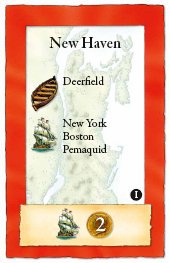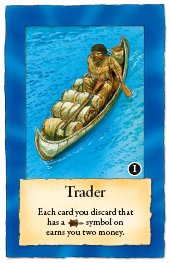Money is used in A Few Acres of Snow for a wide variety of purposes. Primarily it is used to purchase new non-location cards for your deck but it is also used to pay the costs to play some cards, to retrieve cards from your reserve, and to discard extra cards. I'll go into the details of those actions later; today is to look at the mechanisms behind making money.
Note that money doesn't actually do anything in and of itself. It can't be readily converted into victory points like in Dominion. All of the interactive strategies (military cards and ambush/raiding cards) require a fair amount of money to get up and running. Even the non-interactive plan of just building towns can be boosted by some extra cash. So while building up a large money supply isn't going to win you the game by itself it really feels like any winning strategy is going to need access to money in order to function properly.
Money is interesting in this game by virtue of the fact that it accumulates. Money you make in one turn can be spent in future turns and isn't wasted like it would be in Dominion. This means you can focus your early turns on making money and then later in the game spend your nest egg on whatever strategy you've decided to implement. Just make sure your opponent doesn't sneak out a victory on you in the meantime!
At any rate, how do we make money? There are five ways to get money in the game: starting money, the money action, merchanting, trading, and piracy.
Starting money: The French start with 5 gold. The British start with 12 gold. This seems unbalanced but the French deck starts with a regular infantry in it which costs 7 gold for the British player to purchase so it's fairer than it seems. In fact I think the British are at a disadvantage since on top of that 7 gold difference they have another identical card for purchase that I think is the most important one to buy and always buy it first with either side. But it costs 0 for the French and 5 for the British!
Money action: Some cards have a picture of a gold coin on them with a number in the middle, like the New Haven card shown on the right. As one action you can discard one card with a coin on it to make that much money. The British deck is much better suited to using this action than the French deck is. The British start with seven cards in their deck and have the following coin split: 3, 3, 3, 2, 2. In addition they can pick up new locations with the following split: 3, 2, 2. The French on the other hand start with a nine card deck and have the following coin split: 2, 1, 1, 1. They can't add any more to their deck.
Merchant action: Some cards have a picture of a ship on them, like the New Haven card still shown on the right. You can discard a card with a ship on it to start the merchant action. Then you can discard one or two cards with a money symbol on it to make that much money. It's like the money action above except you can do two at a time! And because you fill your hand back up to 5 cards at the end of each turn it actually turns out to be beneficial to discard an extra card in the process. If I have New Haven in my hand along with a 3 coin card I will often use merchant instead of money just to cycle through my deck faster! New Haven is a fine card but doesn't really do a lot and I probably have something important to dig into. The British again have a big advantage here. Four of their seven starting cards have ships on them. If that isn't enough (and it generally is) they have access to two more ship cards for sale and two more from location. The French only have three ships in their starting seven cards. They only have one more for sale and one more from a location. Perhaps worst of all their only 2 money card is also one of their few ships so they rarely have both a ship and something relevant to cash in.
Trader action: This is the action the French player takes when he wants to make money. He starts with a trader card in his deck and both players have a trader card available for purchase in their deck (so the French can go up to two of them if they want). Trader is pretty straightforward. Discard it and any number of furs to make 2 bucks per fur discarded. How do you get furs? Well, some location cards have a fur on them. The British deck starts with one fur. It has 13 more than can be picked up from locations but most of those locations are very hard to reach. I've never felt the desire to buy the trader as the British and I do a mental fist pump if my opponent ever does. Trader is really bad unless you can saturate your deck with furs (merchant for the British is frequently a 6 gold play so you need your 5 card hand to be trader and 3 furs to even match that) and the British deck can't set that up reliably. At least not without being extremely vulnerable to attack. The French, on the other hand, actually start with 4 furs and a trader in their 9 card deck. They have 14 more that can be added from other locations. And unlike the British the vast majority of their early conquests are the spots with furs on them. Trader is a swingier action than merchant is by far. A fair amount of the time you'll end up grabbing 8 bucks out of your trader and that's more than merchant can ever do. But if you draw a hand of 4 furs and a military card you're really sad. The fact that you essentially get to draw 5 cards after a full trader but have to slowly waste time and money discarding cards if you don't have the trader card is really annoying. I should also point out that you could theoretically get as much as 16 gold out of one trader action if you're really lucky and try to set up for it. (There is a 'draw 3 cards' card you can buy and a reserve you can use.) For the most part you'll be trading for 4 or 6 and be pretty happy with that.
Piracy: YAAAAR! This is an action solely for the French player and only if he specifically has the Louisbourg card in his hand. If he does he can play that card and another card with a ship on it in order to gain 2 gold and cause his opponent to lose 2 gold. You still gain the gold even if your opponent has none on hand. This is a solid enough action but isn't spectacular. (Merchant and trader both frequently have 6 gold swings. Piracy is at best a 4 gold swing.) Sometimes your opponent is really counting on having all his gold and you can blow him out by taking 2 of it.
My gut feeling after playing 90 games is that the British have a better money engine but also need to spend more money to buy the cards they need. This is actually only true when dedicated to a military strategy though. If both players are trying to expand a lot then the French actually end up with the better source of cash. The reason I think this is true is that the British deck starts with all their good money cards in it. You can't add a bunch of cards to your deck without really diluting the money power of your deck. (In fact to really swing into gear you need to buy the governor card and destroy two of your starting cards!) On the other hand the French money engine is based around furs and they get a lot of those as they expand. They'll also need to buy a governor or the second trader in order to ensure they keep drawing trader with those furs but neither of those are stretches.
This isn't to say adding cards to your deck makes it worse in general. You need to add cards to your deck at some point in order to accomplish anything! But when it comes to making money both sides are hurt by drawing blanks. The British will find they rarely end up with a ship + 2 gold cards and the French will find they're stuck trading 1 or 2 furs instead of 3 or 4 furs. (Or they'll keep trading 4 furs but only be able to do it every 6 turns instead of every other turn.) Just remember that money sticks around (unless the French keep sending pirates after you) so you can spend a little bit of time early on making cash and then implement whatever your game plan happens to be.


No comments:
Post a Comment